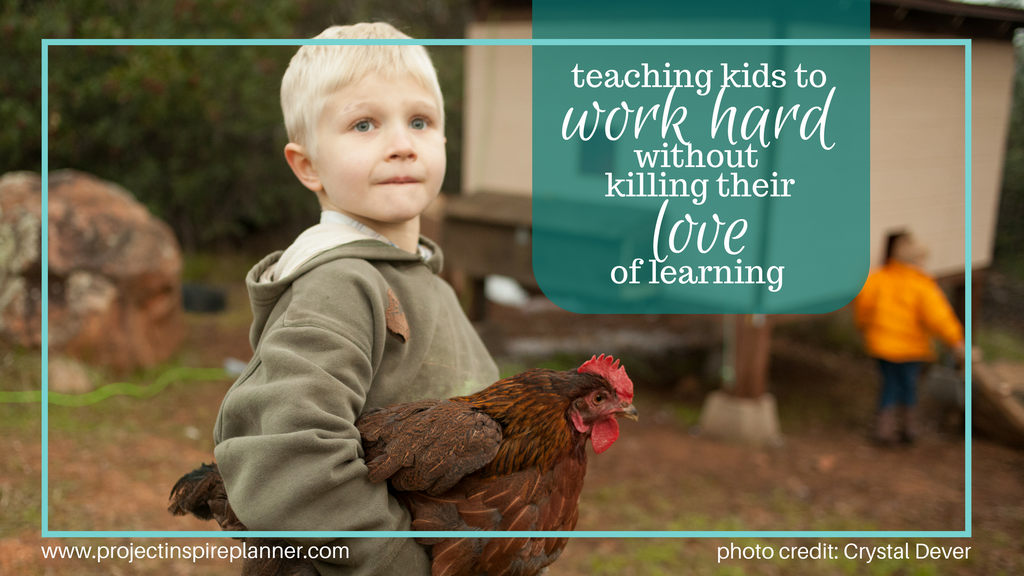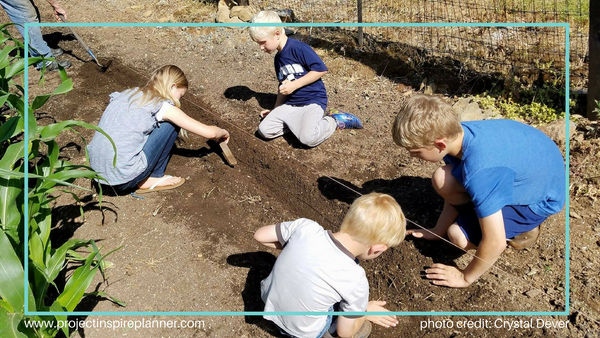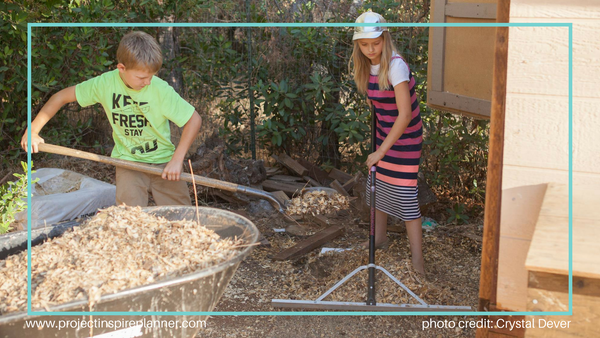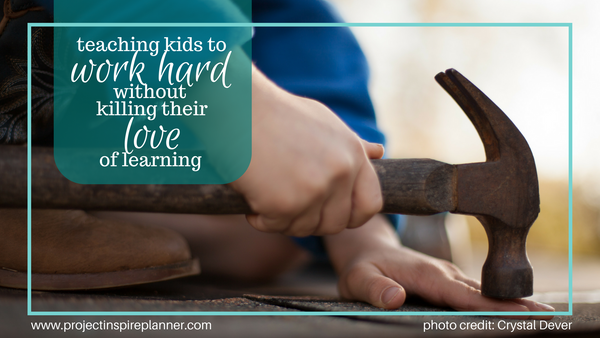
I ended my last blog post Why Does a Love of Learning Matter? with this:
So help your kids fall in love with learning instead of simply giving them assignments. Let their interests grow and meander, encourage them to pursue what they love, and be amazed at what they learn.
--------------
Now, I can guess what you might be thinking - "That sounds all well and good, I want my child to love learning, but we all have to do things we don't want to do. If I let my child learn about whatever he wants, whenever he wants, how will he ever learn to work hard and do things he doesn't want to do?"
Or “How do we teach our kids to not just give up as soon as something gets a little hard? ... I mean sometimes we have to push through and keep trying in order to learn right?”
These are common questions for many who are considering changing paths from requiring to inspiring.
And in one respect this question is right on, kids do, absolutely, need to learn to work hard at things, and push through, even when it’s difficult or they just don’t want to.
A strong work ethic is necessary for a youth to work hard at their education. Teens won't study well on their own, won't get a great education, without a willingness to work hard.
The danger comes, the destruction of their love of learning comes, when we use academics to teach these lessons in childhood, because when young kids are forced to work hard at academics, the inevitable result is that their Love of Learning is squashed.
The main goal of education in the years before puberty should be to help them fall head over heels in love with learning.
When the learning is about what they are interested in, when it's fun and engaging and they are asking for more, that love of learning will fuel their studies for many years to come.
Learning things that they don't care about is too abstract, it's not connected to anything relevant to them, and so it just doesn't compute. Forcing your child to do math every day, when they have no interest in math, is a wasted effort. Wasted in that they aren't really learning deeply, and they usually end up hating math.
Math should be pursued in fun, and it's really hard to make math (or any other topic) fun, if we are pushing them to work hard at it when they are still young.
Working hard at learning when kids aren't yet teens just teaches them that they don't like learning. Again, learning at this age should be fun. After all, I don't think we really want to teach our young kids that learning is hard work, we want them to love it, not dread it.
Even when we try to explain that they need to work hard at learning, for whatever reason that we come up with, that is still very abstract to them.
Physical work makes much more sense to kids, they understand (even if they don't like it) that it takes work to have clean dishes and clean laundry.
It's logical.
It's not abstract the way academic learning usually is.
So, to teach a good work ethic in your children, use physical work.
In doing physical work they learn to work hard, to keep going and finish the job, to have pride in a job well done, and that job makes logical sense.
They can see that the dishes they washed were necessary for dinner.
They can see that animals need to be cared for.

They can see that the laundry they helped with allowed them to have something clean to wear (though my 11 year old could care less if he wears clean clothes).
They can see that because they kept the vegetable garden watered that there are tasty things to harvest.
They can see the natural reward for their work. It makes complete sense to them.
They learn the lessons of hard work, of not quitting, and the reward of feeling that accomplishment of a job well done.
Then, when they reach their teen years, and they love learning (because it wasn't forced, or was allowed to recover through a reboot) they naturally merge their hard work ethic with their love of learning and they work hard at learning.
They don't shy away when the work is hard, they love the challenge.
I've seen this over and over again.
Teens really do enjoy working hard at their learning IF we don't conflate learning a work ethic with academic learning in their childhood.
Allow learning to work hard, and learning to love learning, be separate things during childhood, then in the high school years they will naturally converge.
--------------------------

If you have been trying to teach a work ethic with schoolwork, and want to switch directions, here are four steps to get you headed the right direction.
1. Tell your kids about it.
Admit that you were trying to teach hard work with academics, and you have seen that it killed their interest in learning. You made a mistake, and have decided to change directions. Tell them you aren’t going to force them to learn anymore, but you are going to help them fall in love with learning again.
2. Explain that this means you will be helping them learn hard work with more physical work.
Let them know that they will be working more with you (and hold yourself to this) so they can expect it. Kids need physical work, they need to feel capable and strong, so have them help in situations where you can compliment their strength or capabilities.
I don't necessarily mean sending them off to do chores, I mean jobs.
Small jobs like helping you by carrying heavy boxes, or moving furniture to vacuum underneath, or lugging in the groceries, and big jobs like detailing the car, building a fence with dad, cleaning out the garage together, etc.
Ask them to do small jobs with you or for you throughout the day, and big jobs can be less frequent, maybe once a week or so. Big jobs are a great way for you to get some projects done that have been put off too.
This might take time to work up to, I wouldn’t toss a big job at a child of any age without a fair bit of teaching work in smaller doses first to build their confidence and skill.

3. Show your kids what it looks like to work hard and be proud of a job well done.
Be the example, but don’t just do the work yourself, require their help. This can be as simple as having one child at a time come alongside you and be your assistant for an hour.
Give simple directions - “Hold this”, “Carry this”, “Take this to…”, “Put the ___ away” - and when you are done, stand back and say “Wow, that looks great, doesn’t it? We did a good job!” or even a simple “Awesome, high five!”
4. Give them kudos for working hard.
“This has been a lot of hard work today, well done.” is a simple and effective praise.
Don’t lavish them with compliments, just simple and matter-of-fact thanks is best. “It was nice to have your help today” or “It’s sure nice working with you”.
Even if they complained the whole time, try to find some little thing you can thank them for, even if it’s just “Thanks for not quitting”.
--------------------------
Teaching kids to work hard is unfortunately largely lacking in today’s culture. Kids used to work long hours on top of their education, simply because the family couldn’t survive without that hard work.
Some great read alouds about families working together always helps the work attitude around my home. The greatest standby is the entire Little House series. Start at the very beginning with Little House in the Big Woods and get inspired yourself to enlist your kids and really teach them how to work hard.
(I've compiled a special list of "hard work" classics for you, click here to get it)
Then be amazed at how their work ethic translates to their studies in Scholar Phase.
What if your kids are already teens and have learned to hate learning, and won't study on their own initiative?
Then go back and learn that learning is fun.
Stop the academic requirements and allow them to learn about what they like, and have them do physical work, following the steps outlined above.
Help them renegotiate their whole view of what learning is for.
It's for them.
It's not for you, or the charter, or the homeschool co-op.
It's for them and their future.
Encourage them to learn about whatever they like, to follow rabbit-trails, to dive in deep. Whether it's fishing, or blacksmithing, or HAM radio or drawing or chess or dance, help them dive in, and keep it fun. You can still keep your "school hours" but let them be self-directed for a time, and find their way.
Let them choose what they learn about, and give them the time they need to heal their Love of Learning and learn to work physically, so that they can push themselves to get a great education.
This is a big switch for most of us. We were trained on the conveyor-belt, we were led to believe that learning was hard, that it wasn't fun, and that if we did "just enough" we could mark it off our list and never have to do it again.
But we have the chance to change that. We have the chance to let our children have a completely different relationship with learning than we had. They have the opportunity to love it and push themselves.
So let learning to love learning, and learning to work hard, be separate things, and be amazed at how far they take themselves.
--------------------------
If you liked this blog post, you might also like these: Why Does a Love of Learning Matter? and How to Inspire a Love of Math
--------------------------
Did you love learning as a kid? Why or why not? Tell me in the comments below.
Loved your post! I have 2 dyslexic teens who totally lost their love for learning. My fault I see now. Thank you for giving me hope by telling me that it can be reversed and how to do it. Be blessed.
@Vesteen – Yes, work and play are wonderful for Core Phase kids. When playing devolves into arguments or unsafe actions, you use those moments to teach about those great Core topics of right and wrong, good and bad, and this helps build their character. When you want to share something, share it, but if your kids aren’t interested, don’t push it too far. I’ve been known to tell my kids “just humor me for a few minutes, I think you will like this, if you don’t, I will stop” and then share quickly and with as much enthusiasm as I can muster, if I’m excited, my kids are more likely to at least have a little interest.
As to mentoring yourself, reading Classics just for you can have a great impact on you. Books like Little Women and Little Men, Understood Betsy, The Secret Garden, teach us moms so much about how children learn best, that it makes Core and Love of Learning Phases tangible.
What if after my children work hard (this comes during our morning routines), they want to play? (ages 7 and 10, both core phase, but on verge of LOL). Do I allow and encourage this? Sometimes their play devolves into arguing or getting silly and being unsafe. My other question involves how much of “inspire not require” do I implement at the cost of leading out with some lessons that I think are fun, but might not be up their alley at the moment? I think what I really need is mentoring myself.
Dawn – Did you catch the How to Inspire a Love of Math blog post? https://projectinspireplanner.com/blogs/project-inspire-1/how-to-inspire-a-love-of-math
That is the same method I use for any topic – encouraging a love of learning through playing and exploring.
I love this! But I feel like I need a whole other article on HOW to do this type of learning with my kids! Give them freedom for a time? What things are pushed even if they aren’t fun? Surely reading and math are easiest to grasp when they are younger-in more concrete ways. So-how do I do this with my children on a daily basis?